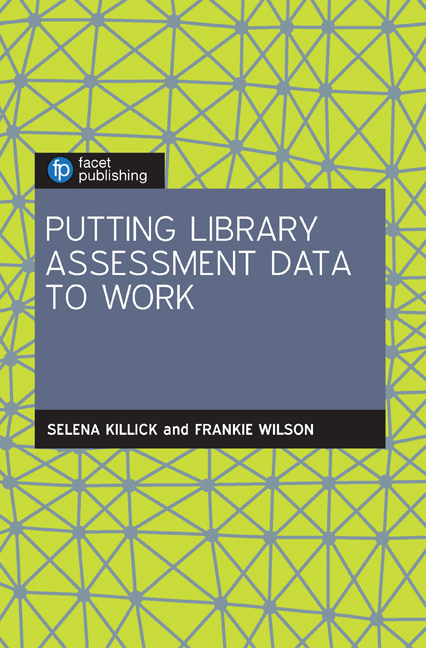Book contents
- Frontmatter
- Dedication
- Contents
- List of figures and tables
- List of case studies
- Authors and contributors
- Acknowledgements
- 1 Introduction to Library Assessment
- 2 Institutional Measures of Student Satisfaction
- 3 Standardised Library Surveys
- 4 In-House Library Surveys
- 5 Library Statistics
- 6 Qualitative Feedback
- 7 Emerging Techniques
- 8 More than Measuring: using Assessment Holistically
- 9 Conclusions
- Index
4 - In-House Library Surveys
Published online by Cambridge University Press: 02 October 2019
- Frontmatter
- Dedication
- Contents
- List of figures and tables
- List of case studies
- Authors and contributors
- Acknowledgements
- 1 Introduction to Library Assessment
- 2 Institutional Measures of Student Satisfaction
- 3 Standardised Library Surveys
- 4 In-House Library Surveys
- 5 Library Statistics
- 6 Qualitative Feedback
- 7 Emerging Techniques
- 8 More than Measuring: using Assessment Holistically
- 9 Conclusions
- Index
Summary
Chapter overview
In this chapter we will discuss the use of locally designed and administered surveys and how they can be used to improve libraries. One of the key concepts discussed in the previous chapter on standardised surveys is echoed here – the use of survey methodologies to evaluate customers’ expectations and perceptions – but the two approaches have different advantages and disadvantages. Standardised surveys are designed by a team, and often some level of analysis is conducted by the tool, saving the library time and money. Library staff design and analyse in-house surveys. And whereas a standardised survey provides a generic set of questions to enable comparisons to be made between institutions, an inhouse survey can provide greater insight by focusing on local issues. Before you embark on a local or a standardised survey, we recommend you identify your strategic needs and determine which methodology suits your library best.
This chapter presents four case studies on how local surveys have been developed and implemented to improve customers’ experience at academic libraries:
• Case Study 4.1 Beyond answering questions: designing actionable surveys to guide assessment, make decisions and support ongoing analysis (Jackie Belanger, Maggie Faber and Steve Hiller)
• Case Study 4.2 Taking users’ opinions into account when managing an academic library: a decade in retrospect (Tatiana Sanches)
• Case Study 4.3 Giving students voice: a biennial user satisfaction survey at Duke University Libraries (Emily Daly, Duke University)
• Case Study 4.4 Listening to the student voice at Library and Learning Services at Kingston University (Davina Omar and Simon Collins, Kingston University).
The University of Washington (UW) Libraries has a strong history of applying library assessment techniques to improve its service to customers. This forms part of the long-standing culture of assessment at the library, using evidence to shape and inform strategic developments. In Case Study 4.1 Belanger and colleagues discuss the large triennial survey used at UW Libraries since 1992, which has led to an evidence-driven culture of continual improvement. In providing examples of how librarians can act on survey results and how internal improvements in the assessment process can enable more effective use of results, the authors aim to provide librarians with ideas they can apply to their own surveys and service improvement efforts.
- Type
- Chapter
- Information
- Putting Library Assessment Data to Work , pp. 55 - 82Publisher: FacetPrint publication year: 2019



